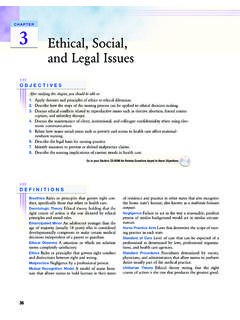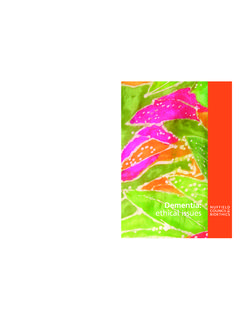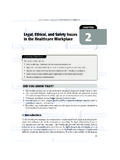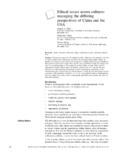Transcription of The Special Topics in Social, Economic and Behavioural ...
1 The " Special Topics in social , Economic and Behavioural (SEB) research "series is a peer-reviewed publication commissioned by the TDR SteeringCommittee for social , Economic and Behavioural research . For further information please contact: Dr Johannes Sommerfeld Manager Steering Committee for social , Economic and Behavioural research (SEB) UNDP/World Bank/WHO Special Programme for research and Training in Tropical Diseases (TDR) World Health Organization 20, Avenue Appia CH-1211 Geneva 27 SwitzerlandE-mail: legal and social issues of genetically modified disease vectors in public healthDarryl Director, Eubios Ethics Institute, Japan and New ZealandAssociate Professor, Institute of Biological Sciences, University of Tsukuba, Tsukuba Science City, 305-8572, JapanEmail: World Health Organization on behalf of the Special Programme for research and Training in Tropical Diseases 2003 All rights use of content from this health information product for all non-commercial education, training and information purposes isencouraged, including translation, quotation and reproduction, in any medium, but the content must not be changed and fullacknowledgement of the source must be clearly stated.
2 A copy of any resulting product with such content should be sent toTDR, World Health Organization, Avenue Appia, 1211 Geneva 27, Switzerland. TDR is a World Health Organization (WHO) execut-ed UNDP/World Bank/World Health Organization Special Programme for research and Training in Tropical information product is not for sale. The use of any information or content whatsoever from it for publicity or advertising,or for any commercial or income-generating purpose, is strictly prohibited. No elements of this information product, in part orin whole, may be used to promote any specific individual, entity or product, in any manner designations employed and the presentation of material in this health information product, including maps and other illus-trative materials, do not imply the expression of any opinion whatsoever on the part of WHO, including TDR, the authors or anyparties cooperating in the production, concerning the legal status of any country, territory, city or area, or of its authori-ties, or concerning the delineation of frontiers and or depiction of any specific product or commercial enterprise does not imply endorsement or recommendation by WHO,including TDR, the authors or any parties cooperating in the production.
3 In preference to others of a similar nature not men-tioned or views expressed in this health information product are those of the authors and do not necessarily reflect those of WHO,including , including TDR, and the authors of this health information product make no warranties or representationsregard-ing the content, presentation, appearance, completeness or accuracy in any medium and shall not be held liable for any dam-ages whatsoever as a result of its use or application. WHO, including TDR, reserves the right to make updates and changes with-out notice and accepts no liability for any errors or omissions in this regard. Any alteration to the original content brought aboutby display or access through different media is not the responsibility of WHO, including TDR, or the , including TDR, and the authors accept no responsibility whatsoever for any inaccurate advice or information that is pro-vided by sources reached via linkages or references to this health information : Jocelyne Bruy reCover design: Lisa SchwarbTABLE OF CONTENTSEXECUTIVE SUMMARY.
4 11. INTRODUCTION .. Ethics of disease prevention .. Bioethics and biotechnology .. Bioethics and molecular entomology .. 62. THE GENETIC ENGINEERING DEBATE .. Growing use of genetic engineering .. International systems for consideration of genetic engineering .. Codex Alimentarius Commission and the safety of genetically modified food .. 8 3. MODIFICATION OF VECTORS AND PATHOGENS FOR PUBLIC HEALTH PURPOSES .. Methods used for control of insect vectors .. Past attempts at introduction of modified pathogens .. Development of genetic modification techniques .. Modification of other organisms .. Modification of human hosts .. 124. ethical AND social ISSUES.. Reducing the complexity of ethical and social issues .. 13 Intrinsic ethical issues of genetic engineering.
5 Animal rights concerns .. Consent from trial participants.. Consent from broader society on environmental risks .. social consensus building and early cessation of trials .. Equality and inequality in access .. Ethics of technology choices and knowledge development .. 20 Intellectual property rights and technology transfer .. Inducement to participants .. 215. PUBLIC ATTITUDES TO GENETICALLY MODIFIED ORGANISMS .. Need for public acceptance prior to interventions .. Results of public opinion surveys on genetically modified organisms .. Wide social and legal discussion of biotechnology .. 25iii6. REGULATIONS.. General basis for regulation .. 27 Cartagena Protocol on Biosafety .. National and regional regulations .. 29 7. RECOMMENDATIONS FOR KEY AREAS TO ENSURE ethical INTEGRITY IN THE USE OF GENETICALLY MODIFIED VECTORS AND PATHOGENS.
6 Establish safety and international standards before field trials .. Information access and local communities as partners .. Group consent .. Environmental assessment .. International cooperation ..34 Further next steps in consultation on ethical , legal and social issues ..34 ACKNOWLEDGEMENTS .. 37 ABBREVIATIONS .. 38 REFERENCES .. 39ivEXECUTIVE SUMMARYE thical, legal and social issues of genetically modified disease vectors in public health1 Consistent with its implicit ethical mandate to reduce human suffering from disease, TDR has out-lined a three-pronged effort to develop genetically modified (GM) mosquitoes for control of trop-ical diseases such as malaria. The approach to genetically modify vectors or their symbiontsand/or pathogens for disease control raises few intrinsic ethical issues; however, important environ-mental and human health concerns need to be assessed before release of any genetically modifiedorganism (GMO).
7 Each country needs to decide its own policy guidance for ethical genetic engineeringof microorganisms, plants, animals and ecosystems, and to negotiate with neighbouring countries; thispolicy advice should be the product of open dialogue involving all sectors of society. However, giventhe broad acceptance of use of GMOs for specific purposes, as endorsed by specialized internationalagencies including the United Nations Development Programme (UNDP) and United Nations Food andAgriculture Organization (FAO), the question is not so much whether to release GMOs but rather howto release them and what type are safe and effective enough to enter field trials. Part of the process is for society to set values for consensus on risk assessment. A universal minimalstandard of risk assessment applicable to disease vectors needs to be defined, as diseases cross nation-al and continental borders.
8 In developing model guidelines, this report recommends examining the fol-lowing issues: Before field release of transgenic insects, researchers must assess all the scientific and social issuesassociated with GM vectors and develop safety precautions to address potential risks. The scientific and social risks should be minimized through careful design of the vector system, rel-evant laboratory experience, and careful choice of the site including considering appropriate socialand cultural factors. Even if there are not perceived to be any realistic risks, a procedure for their evaluation should beset up so that new information can be gathered and interpreted. This procedure may involve estab-lishing a specialized ethical review committee under TDR auspices to offer advice to researchers onthe ethics of projects.
9 There should be prior environmental, medical and social studies for site selection, and the mostappropriate site chosen on the basis of these data. Information should be exchanged as broadly as possible with community leaders, members of thelocal community, and the mass media. Consent should be obtained from the communities involved. Specific mechanisms to obtain indi-vidual and group consent need to be developed for public health interventions. A contingency plan for aborting a field trial needs to be developed. Commitment to the local communities involved in field trials should be made such that they will bethe first beneficiaries of more permanent use of a GM vector should results indicate that this isappropriate. Intellectual property concerns should not be barriers to implementing public health measures usingGM vectors or their symbionts and/or pathogens.
10 Prior negotiation, including possible involvementto allow access to the latest technology, is preferable to confrontation. To avoid any suspicion by the public that could result in public rejection of the approach, TDR andmember governments should not involve partners in the projects from any military research data should be made available to all in order to benefit from global expertise and develop inter-national consensus. There is a need for an ongoing and active process of ethical analysis, through avariety of forums, and TDR is called upon to take a lead in elaborating and developing ethical andscientific standards for research in this , Economic and Behavioural research Special Topics No. 12 ethical , legal and social issues of genetically modified disease vectors in public health31 Ethics of disease preventionThe ethical mandate of TDR is to improve existing and develop new approaches for preventing, diag-nosing, treating and controlling infectious diseases that cause loss of human life.










